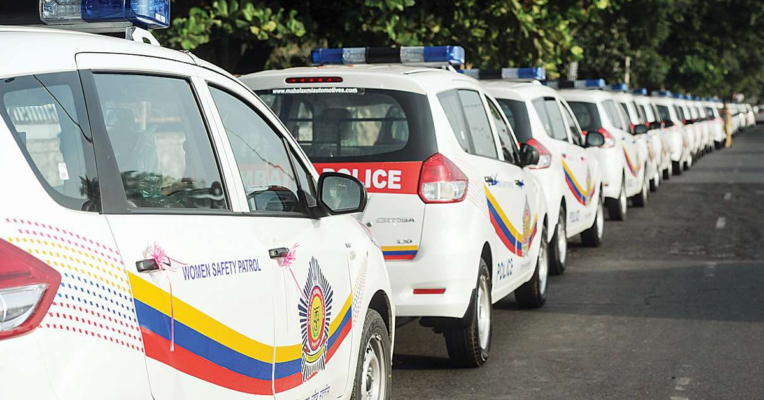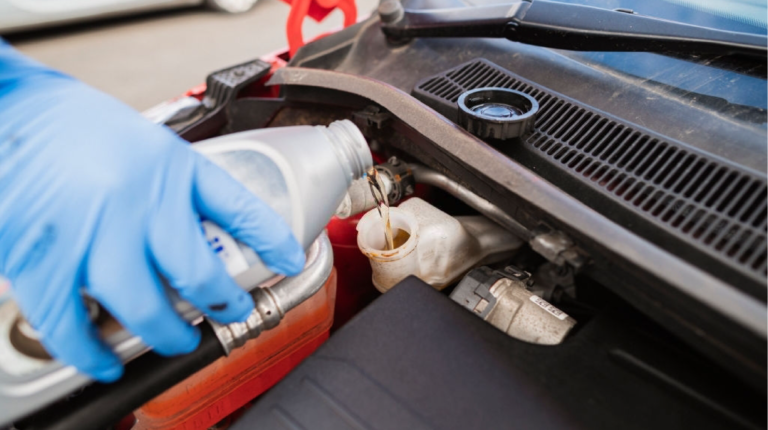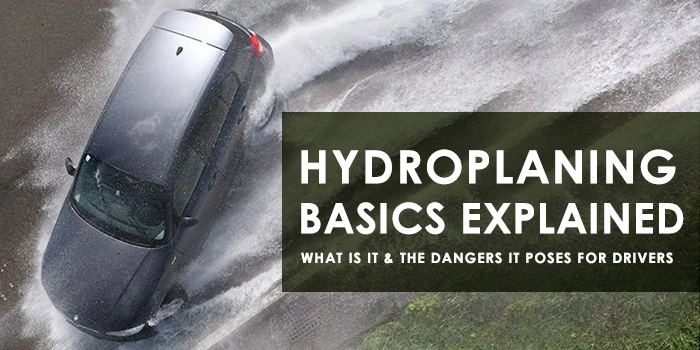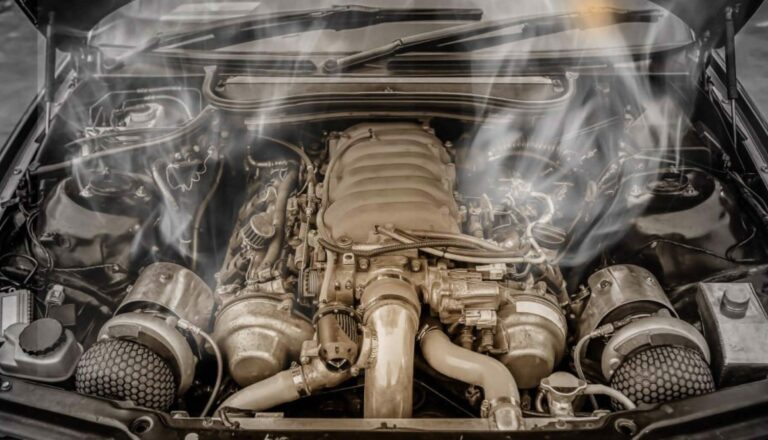
Most of the time, driving is a relaxing experience where we can unwind after a hard day’s work, a place where we can get some peace on our way home or to any other destination. But sometimes, tyre noise in the car gets loud enough to disturb our peace, and if the tyre noise is excessive, we should definitely try to reduce it.
Let’s go ahead and discuss ways to reduce tyre noise in the car. There are many reasons for an increased tyre noise in your car. By figuring out how to reduce the noise or the causes of the noise, we can have a much more relaxed ride.
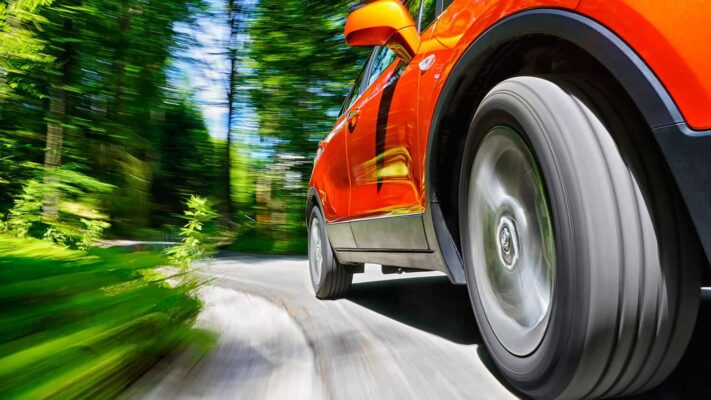
Some tyres are generally loud when we drive around and this will be addressed too. There are times when you will have to replace the tyres, so we have to pick new ones that are quiet. There are also ways to soundproof cars, which we look into as well.
Noise can also creep into the car from rattling speakers, a noisy suspension, loud exhaust, and an engine that has not been serviced for a long time (for example, the oil has not been changed)
Reasons Why There Might Be Excessive Tyre Noise
Off Road Tread Patterns –
Tyres with really thick tread patterns also called knobby tyres, can make a lot of noise when they rotate. The sound is like a humming noise that you often hear with large pick-up trucks driving down the street. The sound comes from air pockets that are being caught and crushed at a rapid pace.
Wide Tyres –
Wide tyres have a lot of contact with the ground because of their large surface area, and will generally make more noise. They are known as performance tyres and are good for adding more traction while driving, but it also means that they will be more noisy than regular tyres because of the added contact area with the road tarmac.
Tyres That Are Not Balanced –
Unbalanced tyres will vibrate a lot and cause much tyre noise. The noise is due to the vibration of the tyres at high speed. Unbalanced tyres will also wear out much more quickly than balanced tyres.
Tyres That Are Not Inflated Completely –
Tyres that are underinflated will spread out on the tarmac and make a larger contact surface area with the road. With more area in contact with the road surface, tyre noise will increase.
Also Read: Summer Tyres vs Winter Tyres vs All-Season Tyres
Tyres That Have Not Been Rotated –
If your car tyres have not been rotated in a long time, they will cause more vibrations and noise than tyres that have had their rotation on schedule. Without having the tyres rotated, they get worn out only on one side and cause a lot of rough noises. The tyres will not last as long either and their life expectancy is reduced.
Also Read: Low Profile Vs Normal Vs High Profile Tyres.
Performance Tyres –
Standard tyres used in passenger vehicles are made with a rubber compound that is soft and quiet when run. Performance tyres are built with other purposes in mind like high traction, grip and the ability to cope with high speeds while keeping contact with the road. Because of this they are not the quietest tyres on the road. Features of performance tyres that may cause them to be a bit noisier are stiffer sidewalls, deep and aggressive tread patterns for higher grip levels, and wider contact area with the road surface.
Unevenly Worn Tyres and Suspension –
If the tread on the tyres is worn out unevenly due to lack of rotation as per the schedule or not being balanced, or worn-out suspension, then they be noticeably louder than other tyres. The extra noise is caused due to vibration which will stress out the vehicle and reduce the lifespan of the tyres.
Debris Stuck in Tyre Tread –
It is common for rubble like little pebbles, sticks and small stones to get embedded in the tread of the tyre. As the tyres rotate, this debris will hit the road surface at a rapid speed, causing more noise than a tyre without anything stuck in its tread.
Also Read: Everything You Should Know About Cracked Tires.
Ways to Reduce Tyre Noise
There are several ways to reduce tyre noise from creeping into the cabin while you are driving. The ways range from soundproofing the interiors, keeping your tyres in good condition and driving carefully.
Each of these ways will go a long way in giving you a quieter driving experience.
Also read: Retreading Tires : Is It Safe For Your Vehicle?
Replacing the Tyres With Quiet Ones
Some tyres are quieter than others while driving. There are other tyres available on the market that are built with technology to reduce tyre noise as much as possible, to provide the quietest ride ever.
There are also tyres on the market that do not have noise reduction as their priority, instead they have performance and grip as their major purpose.
If there is excessive tyre noise as you drive, you may find the best solution is to replace them with a set of tyres that are intended to deliver a quieter ride. It could turn out to be quite expensive, but it is one of the most effective ways you can reduce tyre noise.
There is a new range of tyres sold by certain brands that can reduce interior tyre noise by as much as 9 db. Other tyre brands have technology known as noise cancelling and silent acoustics to provide a soft and quiet ride.
Changing Tyres When Needed
When tyres begin to wear out, they tend to get noisy. There are certain things that lead to a tyre getting worn out, but then again, the lifespan of a tyre is 6-7 years anyway, and will have to be replaced by that time even if they are not worn out, simply because the rubber compounds expire and are not as effective as they once were.
If you replace the tyres on your car every 5-6 years, you can ensure a quiet ride. Check your tyres for damage and inspect the amount of wear in them. You should look out for cracks in the rubber, dry rot, missing parts of the tread, and objects that may get stuck in them like a screw or nail.
Have your tyres balanced at an authorised service station and rotate the four tyres according to the manufacturer’s recommendation. Also keeping them fully inflated will increase their lifespan and give you trouble free (not to mention, quiet) driving.
Driving at Slow Speeds
When you are driving faster, the tyres are noisier because of the greater amount of air that is being circulated within the tyre treads. If you constantly drive your vehicle at a high speed, you may be causing more noise from your tyres than you would if you were driving slower.
If you reduce the speed you are driving at, you may end up making less noise from your tyres.
Also read: Tire Regrooving and their Advantage.
Soundproofing the interior
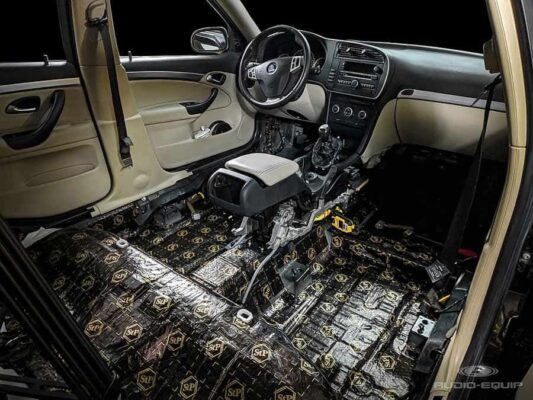
Since your car tyres are directly beneath the vehicle under carriage, most of the noise created by them permeates through the floor. As you drive your car, a certain amount of noise is inevitable and cannot be avoided. But if you add soundproofing to the floor and interior trim, you can significantly reduce this tyre noise.
There are many products available at car accessory stores that can be used to soundproof the vehicle floor and interior. They offer excellent sound blocking characteristics to reduce vibrations, tyre noise and harshness in the cabin.
There are also some products known as sound deadening spray. It offers the same sound protection as soundproofing materials, but in spray form it can be added to all the nooks and crannies that are hard to reach.
Filling Your Tyres to the Recommended Level
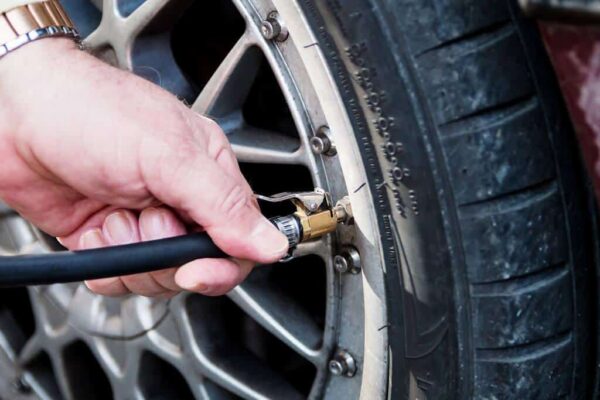
Underinflated tyres make more noise due to an increased contact patch with the road. If tyres are inflated to their recommended levels, then tyre noise is at a minimum irrespective of the vehicle speed. Not only is tyre noise reduced, you also end up getting better fuel economy, because the tyres produce less resistance and less friction with the road surface.
Always check the tyre pressure after parking the vehicle for a few hours because they will be cool at this time, and you won’t get a false high reading on the pressure gauge.
If you find the tyre pressure to be low, fill it up to the specified level which can be identified from the door sill, the vehicle manual or on the side wall of the tyre.
Soundproofing the Wheel Wells
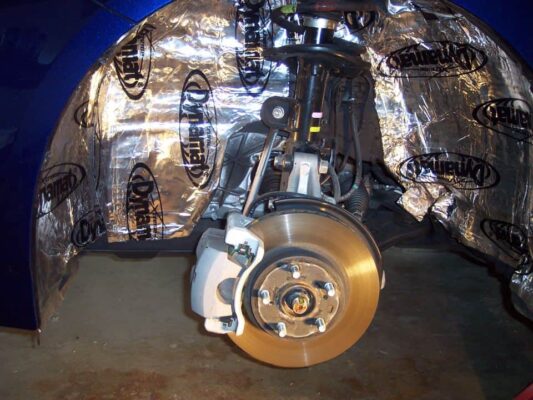
The area around the wheels under the wheel arch is called the wheel well. There is a wheel well protector in place, which is a thin plastic or foam padding that prevents dirt and debris from being kicked up onto the body of the car. But these protectors don’t stop noise from entering the cabin.
Sound proofing material can be added underneath the plastic protectors to stop the rumble of the tyres from entering the cabin. The soundproofing material can be added below as well as on top of the plastic inserts for double soundproofing the interiors.
The soundproofing material usually has an adhesive to make it conveniently stick to the wheel arch well. Soundproofing spray can also be added to the material for an extra level of sound insulation.
Also read: How to fold car cover alone.
Rotating and Balancing Your Tyres
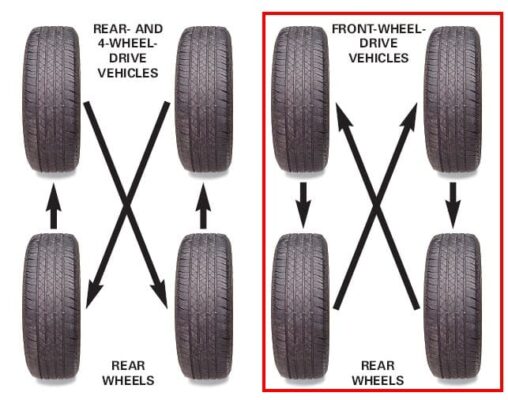
Tyres should be rotated and balanced at least every 10,000 km or for a daily driver car about every 5-6 months.
Rotating the tyres is the process of switching tyre position (for example front left to rear left, rear right to front right) making use of the spare tyre in the rotation as well. This ensures that the tyres wear evenly and do not vibrate while driving.
Tyre shops that replace tyres are well versed with this procedure and it is usually done complimentary if you purchase tyres from them. Balancing is adding small weights to the rim so that the tyre rotates smoothly while driving. This prevents any unwanted vibrations and noise.
Soundproofing the Doors
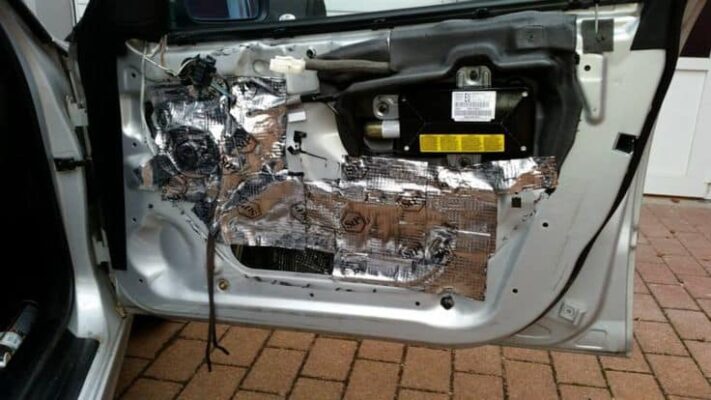
Doors are usually made of thin metal and sound easily enters the cabin from them. Due to their construction, they are also hollow and act as a resonation chamber for tyre noise.
Soundproofing material like the one used on cabin floor and wheel wells can also be added to the doors to insulate sound from the tyres.
A soundproofing spray can also be used instead of material if it is too difficult to apply in the door seals. Doors have a lot of cut outs and panels embedded in them, so make sure to dismantle the whole part so that you can easily use the sound deadening material in them.
Also read: Prevent Car Theft With These Awfully Simple Tricks & Devices
Door Seals
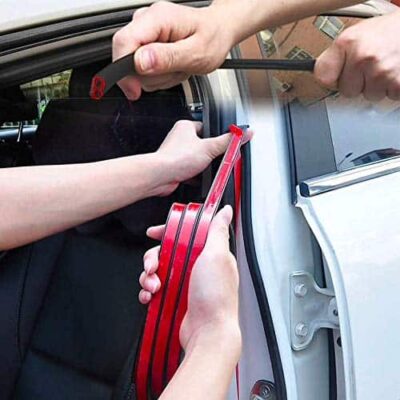
Sounds have a tendency to creep into the cabin from any gaps or entry points, the doors being the biggest ones. Once the door is closed, the door seals and beading help make a tight seal to prevent sound and water from entering the interior.
If the seals are worn out, it may allow tyre noise to get through. Since the seals are made from rubber, they can crack and rot in heat and moisture.
Replacing the seals when they are worn out is the best way to keep tyre noise at bay and prevent it from entering through gaps in the door seal.
Also read: 7 Essential Car Safety Features in India
Conclusion
A quieter set of tyres, or tyres that are specifically meant for passenger cars will have features that will give you a soft and quiet ride.
There are many causes for loud tyre noise while driving, and many solutions that exist to prevent the noise from getting too loud. This article explains the reasons for loud tyre noise and ways you can fix the problem.
Many drivers go through their daily drives without noticing the effect of tyre noise. They either get accustomed to it or deal with the idea that they cannot do anything to improve the situation. Of course, there are multiple factors that contribute to loud tyre noise, and this article deals with those causes and ways to solve them.
We hope that there has been some light shed on this issue and wish you many more miles of noise free driving. For more such interesting content visit carorbis blog.


